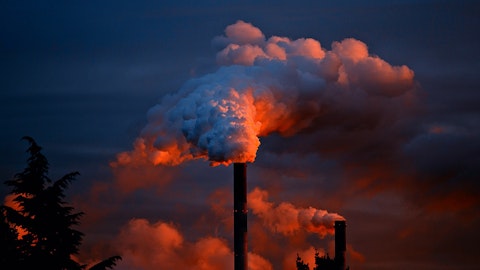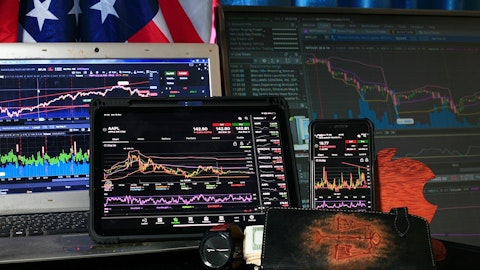4. Shell plc (NYSE:SHEL)
Number of Hedge Fund Holders: 39
Shell plc (NYSE:SHEL) is a London-based energy and petrochemical company with operations in Europe, Asia, Oceania, Africa, the United States, and rest of the Americas. The company refines crude oil and other feed stocks, such as low-carbon fuels, lubricants, bitumen, sulfur, gasoline, diesel, heating oil, aviation fuel, and marine fuel. It is one of the leading oil refinery stocks to monitor. On November 28, Shell plc (NYSE:SHEL) said it agreed to acquire Danish biogas producer Nature Energy Biogas from Davidson Kempner Capital Management for nearly $2 billion. It is Europe’s largest producer of renewable natural gas, which will improve Shell plc (NYSE:SHEL)’s capacity to work with its established customer base across multiple sectors to accelerate its transition to net-zero emissions.
On December 6, Deutsche Bank analyst James Hubbard raised the firm’s price target on Shell plc (NYSE:SHEL) to 2,987 GBp from 2,761 GBp and kept a Buy rating on the shares.
According to Insider Monkey’s data, 39 hedge funds were long Shell plc (NYSE:SHEL) at the end of September 2022, and Ken Fisher’s Fisher Asset Management held the largest stake in the company, with 20.8 million shares worth over $1 billion.
Here is what Harding Loevner International Equity Fund has to say about Shell plc (NYSE:SHEL) in its Q1 2022 investor letter:
“While risks of unforeseen consequences arising from the Ukraine conflict are high, on this front we are cautiously optimistic that China will work hard to maintain its neutrality in a credible way, as it is a huge beneficiary of trade with the rest of the world, especially the rich developed nations. We think it likely that China, along with India, will continue to buy oil and gas from Russia (just as Europe, at least for now, plans to keep its gas pipelines open), and do not expect that fact to alter China’s trade relations with the West much. Nevertheless, we must contemplate that our optimism is misplaced on the importance of membership in the global network of exchange. If our central and optimistic case—admittedly an educated guess—is wrong, then we’d need to greatly modify our views of which companies in our opportunity set will face new barriers to profitable growth, and which might stand to benefit, relatively, from a further receding of globalization. (Global trade, after all, has never matched the peak share of GDP it reached in 2008, before the Global Financial Crisis.) We’d expect such a world to be less efficient, as the cold logic of comparative advantage is demoted as a determinant of which goods or services are produced and where. That would lead to a less prosperous world, since exploiting comparative advantage is a cornerstone of wealth creation. If regional blocs began to raise limits on the movement of capital as well as goods, we’d need to parse which of our multinational companies were at risk of declining sales from increasingly hostile, siloed countries. Royal Dutch Shell (NYSE:SHEL) has found its Siberian oil and gas joint venture assets stranded by the combination of sanctions and the public opprobrium of Russia’s actions.”
Follow Shell Plc (NYSE:SHEL)
Follow Shell Plc (NYSE:SHEL)
Receive real-time insider trading and news alerts





